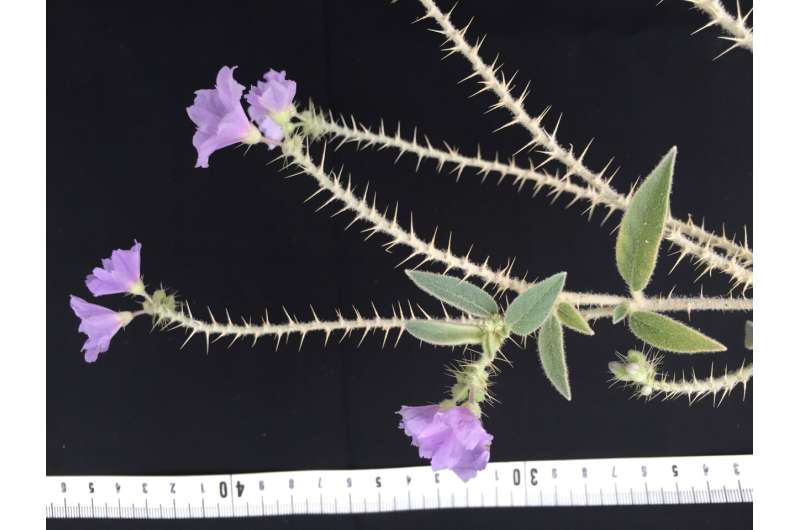Scientists highlight safe access to the outdoors with naming of new plant species

A new species of Australian bush tomato described from the Garrarnawun Lookout in Judbarra National Park provides a compelling example of the need to provide equal and safe access to natural places. Bucknell University postdoctoral fellow Tanisha Williams and biology professor Chris Martine led the study following a chance encounter with an unusual population of plants during a 2019 research expedition to the Northern Territory.
Martine, who has studied northern Australia’s bush tomatoes for more than 20 years, immediately sensed that the plants were representative of a not-yet-described species, so he, Angela McDonnell (St. Cloud State University), Jason Cantley (San Francisco State University), and Peter Jobson (Northern Territory Herbarium in Alice Springs) combed the local area for plants to closely study and make research collections from.
The task was made easier by the fact that the Garrarnawun Lookout is accessible by a set of dozens of human-made stone steps running directly from the unpaved parking area to the peak of the sandstone outcrop—without which the new species might have otherwise gone unnoticed.
The botanists were able to collect numerous new specimens and have now published the new species description in the open-access journal PhytoKeys, choosing the name Solanum scalarium as a nod to the steps leading to the plant and the unusual ladder-like prickles that adorn the flowering stems. The Latin “scalarium” translates to “ladder”, “staircase” or “stairs.”
“This Latin name does relate to the appearance of this species, how it looks,” says first-author Williams. “But it is also a way for us to acknowledge how important it is to create ways for people to interact with nature; not just scientists like us, but everyone.”
According to the authors, a recent study done by the Department of Local Government, Sport and Cultural Industries in Western Australia found that 8 in 10 people felt it is important to have access to natural spaces, both locally and outside of their current jurisdictions.
However, one in three persons felt dissatisfied with the current outdoor spaces available to them and many identified barriers to access and participation in outdoor activities that include urbanization—which is especially credited for the growing number of Australians that lack outdoor experiences.
Importantly, the awareness of who has access and feels safe to participate in outdoor activities is being recognized throughout Australia and the lack of diversity in participation from culturally diverse and marginalized populations has been identified as an issue. Key indices such as ethnic background, socio-economic status, physical abilities and gender, are indicators of low outdoor recreation participation.
“These disparities of who are and are not participating and who feels safe and welcomed are artifacts of historic and current environmental and social injustices,” notes Williams. “To overcome these injustices and increase access and participation from diverse groups, intentional and targeted efforts are needed to provide a range of outdoor experiences that attract people from all of the 270 plus ancestries with which Australians identify with and special attention should be placed on groups historically excluded from outdoor spaces.”
Also now known as the Garrarnawun Bush Tomato, Solanum scalarium is a distant cousin of the cultivated eggplant and a close relative to a number of other Australian species recently discovered by Martine and colleagues that were also published in PhytoKeys including Solanum plastisexum, named to reflect the diversity of sex forms across Earth’s organisms; and Solanum watneyi, named for the space botanist of the book/film The Martian.
The scientists hope that the naming of this latest new species highlights the importance of building community around natural spaces.
“We suggest the use of Garrarnawun Bush Tomato for the English-language common name of the species,” the authors write, “In recognition of the Garrarnawun Lookout near where the type collection was made, a traditional meeting place of the Wardaman and Nungali-Ngaliwurru peoples whose lands overlap in this area.”
Access to nature is not just a concern in Australia.
“In the United States, where most of the authors of this paper are located, “access” is one thing but safety and equitability are another,” says Martine, “The U.S. National Parks Service reports that around 95% of those who visit federal parks are white. Meanwhile, African Americans, Latinos, women, and members of the LGBTQIA+ communities often report feeling unwelcome or unsafe in outdoor spaces.”
“If African Americans, for example, are already apprehensive in a country where they make up 13% of the population, it should be understandable that they are hesitant to be part of a community where they represent as little as 1% of participants.”
Williams suggests that James Edward Mills, author of The Adventure Gap (2014) put it best:
“It’s not enough to say that the outdoors is free and open for everyone to enjoy. Of course it is! But after four centuries of racial oppression and discrimination that systematically made Black Americans fear for their physical safety, we must also make sure that we create a natural environment where people of color can not only feel welcome but encouraged to become active participants as outdoor enthusiasts and stewards dedicated to the protection of the land.”
More information:
Tanisha M. Williams et al, Solanum scalarium (Solanaceae), a newly-described dioecious bush tomato from Judbarra/Gregory National Park, Northern Territory, Australia, PhytoKeys (2022). DOI: 10.3897/phytokeys.216.85972
Citation:
Scientists highlight safe access to the outdoors with naming of new plant species (2022, December 21)
retrieved 21 December 2022
from https://phys.org/news/2022-12-scientists-highlight-safe-access-outdoors.html
This document is subject to copyright. Apart from any fair dealing for the purpose of private study or research, no
part may be reproduced without the written permission. The content is provided for information purposes only.
For all the latest Science News Click Here
For the latest news and updates, follow us on Google News.

